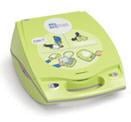
April 3, 2009 - ZOLL Medical Corp. said yesterday it initiated a voluntary worldwide field corrective action on its ZOLL AED Plus automated external defibrillator, where the company found some batteries do not work properly when used with AED Plus defibrillators manufactured prior to Feb. 12, 2009 (serial numbers below X_ _ _200000).
In addition, the version of the AED Plus self-test software installed in these devices does not adequately detect defective batteries. As a result of these two issues, the AED Plus defibrillator may fail to deliver defibrillation shocks during treatment of sudden cardiac arrest. The company’s investigation is not complete at this time.
This corrective action applies to approximately 180,000 units. Devices installed for at least three years are at the highest risk, a population of approximately 80,000. Although this issue was identified through customer reports from non-clinical testing, there has been one clinical event reported in which a defibrillation shock was not delivered, the patient subsequently died, and an evaluation of the device found that the batteries experienced the identified problem. At this time ZOLL has reviewed all reported patient events and found up to three additional cases in which a shock was not delivered to a patient and the battery may have experienced the identified problem. The company was informed that in one of the cases the patient subsequently died.
The required correction is available in the form of a software update, which can be downloaded from the company’s Web site and installed by the user. This new software, which is included in current shipments of the AED Plus, can detect this battery defect condition if it occurs within the maximum five-year standby lifetime, and alert the user to install fresh batteries.
Working with its distributors, ZOLL began notifying customers with affected devices on Feb. 12, advising the immediate replacement of batteries on a three-year schedule until their device software can be updated. There is no need to remove devices from service pending the corrective action.
Although the root cause investigation is not fully complete, it appears that high internal resistance can develop in some batteries after several years in standby mode. It is possible that this can lengthen charging time beyond specified and clinically acceptable limits, resulting in the failure of the AED Plus to deliver a defibrillation shock. It is difficult to predict which batteries may develop this condition, and the affected devices’ self-test does not detect this condition. The FDA has been notified of this problem and is expected to classify it as a recall.
This action does not apply to AED Plus devices manufactured after Feb. 12, 2009 (serial numbers above X_ _ _200000), and the company does not expect any disruption in AED Plus supply or unusual backlog from this corrective action.
More information: www.zollaedplusbatteryhelp.com/

